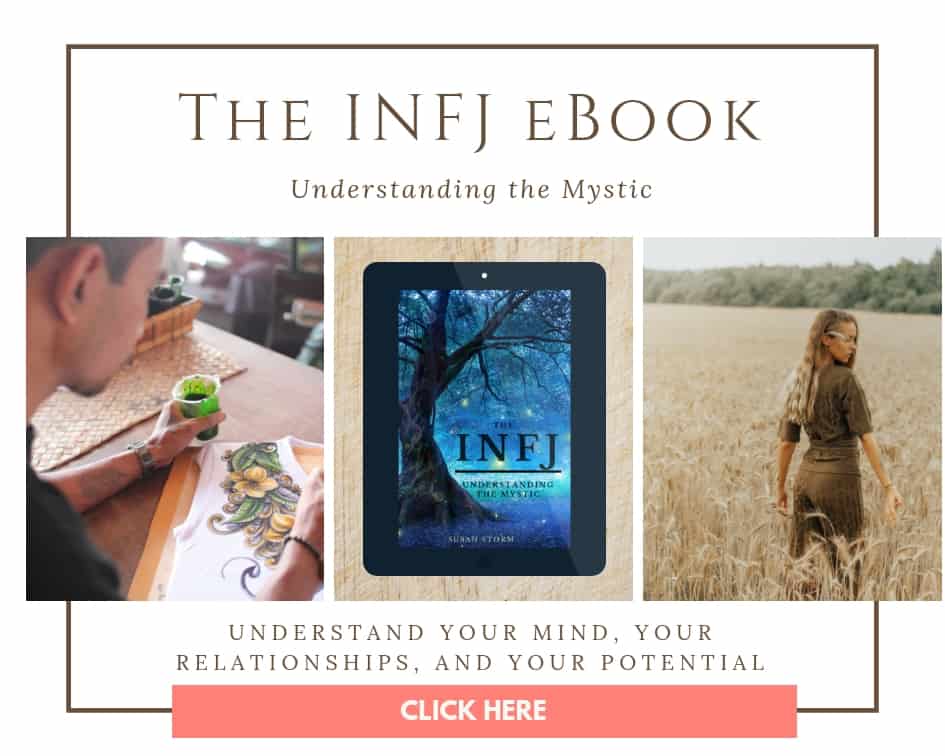The Unexpected Desire of Every Myers-Briggs® Personality Type
Each of the 16 Myers-Briggs® personality types is blessed with some incredible strengths and abilities. NJs can grasp patterns and trends, SJs have an intense awareness of what’s reliable and healthy, NPs notice abstract connections and relationships, and SPs are observant and quick to respond. There are so many things that each type can do well, but there’s also a secret desire that each type really craves in life (even though they might hide it from others). This desire is what we’re going to be exploring today.
Not sure what your personality type is? Take our new personality questionnaire!

An Introduction to the MBTI®
If you’re not sure what the letters in your personality type mean, let me break it down for you:
E – If your personality code starts with an “E” that means you are an Extrovert. You get energy from interaction with the world around you.
I – If your personality code starts with an “I” that means that you are an Introvert. You get energy from the inner world of introspection and reflection.
S – If your personality code has an “S” in the second position that means that you are a Sensor. You are in touch with the natural world and what you can perceive through your five senses. You prioritize being realistic and pragmatic and are in tune with your body and the details around you.
N – If your personality code has an “N” in the second position, that means that you are an iNtuitive. You are in touch with the world of possibilities and imagination. You focus on abstract connections and theoretical “What if’s” more than what currently exists.
T – If your personality code has a “T” in the third position, that means that you are a Thinker. You value objective logic when you make decisions. You consider the pros and cons and check for accuracy.
F – If your personality code has an “F” in the third position, that means that you are a Feeler. You consider interpersonal harmony and ethics when you make a decision. You consider your values and how the people around you will be impacted.
J – If your personality code has a “J” in the fourth position, that means that you are a Judger. You enjoy having closure on decisions and you tend to organize your world so that there is structure and a clear plan. You like to finish one thing completely before starting another.
P – If your personality code has a “P” in the fourth position, that means that you are a Perceiver. You enjoy being spontaneous and pride yourself on your adaptability. You are drawn to variety and enjoy surprises. You tend to mix work with play.
Keep in Mind:
There will be times in your life where you feel like all of these preferences apply to you. Remember that these are preferences, not constraints. Judgers will have moments where they act like Perceivers, but they will more consistently choose a Judging lifestyle. Thinkers will have moments where they connect with their Feeling side, but they will more frequently take a Thinking stance. Today we’re going to be exploring some of the contradictory traits of each personality type.
Not sure what your personality type is? Take our new personality questionnaire here. Or you can take the official MBTI® here.
The Unexpected Desire of Every Myers-Briggs® Personality Type
The ENFP
Bursting with ideas and possibilities, you’re someone that people turn to when they feel that they’re out of options. You bring new life and inspiration to moments that would otherwise be dull and monotonous. You’re a master of creativity and enthusiasm, but sometimes you really crave consistency and a sense of “home.” Sometimes you wish you could shut off the constant hum of ideas in your mind and actually take care of yourself and re-experience the simple pleasures you knew and loved growing up. You can be surprisingly nostalgic, even though it seems like you are always running forward instead of looking back. At times you find yourself wishing for a future life that is stable, consistent, and filled with some of your favorite steady friends. But because you are so drawn to novelty, exploration, and innovation you tend to put off that future indefinitely.
Ways to Satisfy This Need:
- Establish small, enjoyable routines (e.g., morning coffee ritual, weekly movie night).
- Create a “Home Base” – a cozy space with nostalgic comforts.
- Set gentle reminders for self-care (e.g., hydration, sleep, relaxation).
- Plan “sabbaticals” where you take a break from novelty and immerse yourself in familiar comforts.
Read This Next: 7 Reasons Why You Need an ENFP Friend in Your Life
The ENTP
Ingenious and curious, you’ve been blessed with an explorer-like spirit. You love taking apart problems and seeing all the different angles, leverage points, and possibilities within that problem. You can easily catalyze people and shape situations to achieve goals and spark change. Yet even though novelty and change are constantly pushing you forward, there’s a part of you that will always long for something stable and secure. Yes, you’re a risk-taker. Yes, you hate monotony. But deep down you find yourself craving a future life that is stable and filled with simple pleasures. You imagine being someone who remembers to drink 8 glasses of water a day or takes a morning walk at the same time every day, stopping at the same spot for your favorite coffee. This contradictory desire for both change and sameness can confuse you at times. You hope someday when all your ideas have been explored, you’ll be able to quiet your mind enough to experience this consistent, stable lifestyle.
Ways to Satisfy This Need:
- Incorporate one consistent habit into your daily life (e.g., a 10-minute morning walk).
- Dedicate time to deep work, avoiding distractions to build discipline.
- Set up smartphone reminders to help you remember to drink enough water or get to bed on time.
The INFP
Imaginative and creative, you’ve been gifted with an idealistic, curious spirit. You’re someone who believes in upholding the integrity of others, contemplating life’s mysteries, and envisioning a better tomorrow. People admire you for your sincerity and originality, but you often find yourself wishing that implementing your ideas was easier. Segmenting, organizing, and making your life more efficient can feel like an insurmountable chore. Sticking to a schedule is often overwhelming and exhausting. While you’re filled to the brim with creative ideas, figuring out the logical order of events and being consistent can be a struggle. The good news is that with age this process tends to become easier, but sometimes this desire for efficient action feels perpetually out of reach.
Ways to Satisfy This Need:
- Use visual planners or mind maps to make structure feel more creative.
- Set one small organizational goal per day (e.g., tidy a desk, plan a meal).
- Find a way to make schedules meaningful—connect them to things you personally love (i.e. do the dishes while listening to a favorite audio book)
- Use apps that automate reminders for consistency without feeling restrictive.
- Reward yourself for following through on plans, reinforcing positive habits.
Read This Next: 10 Things You Should Never Say to an INFP
The INTP
You’re a master of theorizing, analyzing, and explaining how the world works. You see the underlying principles of things and can define their essential qualities. People come to you when there’s a complex problem to troubleshoot or they want to see something from a new, creative angle. Yet while you tend to appear detached, logical, and unconcerned with feelings, there’s actually a part of you that craves warmth and emotional connection. You wish you knew the right words to say in social situations, and you often crave an understanding of the emotional ties between yourself and others. Sometimes you’re frustrated because people label you as “Cold” or “Robotic” without realizing how deeply you really care. You tend to see relationships going on around you as if you are an outside observer, and there are moments where you deeply crave to be on the “inside.” On the bright side, understanding social conventions, rules, and emotional interactions tends to come more easily over time and maturation.
Ways to Satisfy This Need:
- Study social dynamics like a system—observe patterns in interactions.
- Practice small acts of emotional connection (e.g., sending a thoughtful message).
- Take part in simple, structured social settings where expectations are clearer.
- Read psychology books to better understand emotions and relationships.
Read This Next: 10 Things That Excite the INTP Personality Type
The ENFJ
Known for your profound interpersonal insight, you are someone who finds it easy to empathize with people and influence them to learn, grow, and develop. Your perceptiveness and goal-oriented nature motivate you to achieve great things for people. But there’s a part of you that always yearns for more knowledge, more information, and more confidence in your logic. Sometimes you find yourself obsessing over facts and trying to be “perfectly” accurate in everything you say. You tend to beat yourself up if you make even the slightest logical error and you can go on knowledge-seeking binges, trying to fill a need for logical cohesion and truth. People who only see your warm, empathic side might be surprised to realize how deeply you crave rational consistency and understanding in all your views.
Ways to Satisfy This Need:
- Set aside time for deep-diving into topics purely for intellectual enjoyment.
- Allow yourself to be okay with making small mistakes in logic—it’s a growth process.
- Create structured study sessions to satisfy knowledge cravings.
- Keep a personal notebook of insights and logical breakthroughs.
Read This Next: The Shadow of the ENFJ Personality Type
The ENTJ
You’re someone that people look to for a plan of action, a strategic insight, or a roadmap to success. You focus on efficiency and logic, getting plans in place and achieving goals. While you have a very no-nonsense, strategic outlook on life, there’s a softer side of you that most people fail to see. You crave a life of personal meaning and significance. You want to reach goals that are more profound than status or achievement. You crave a sense of inner integrity and emotional harmony and connection. You want to contribute something worthwhile to the world – something greater than financial success or prestige. Many times you will work tirelessly towards a cause you believe in, whether that’s charity, environmental work, or relief for marginalized people. But this side of yourself isn’t something you typically “promote” and few people actually see it.
Ways to Satisfy This Need:
- Take time to think about your personal personal values and life purpose regularly.
- Find ways to take part in meaningful philanthropy or passion projects outside of work.
- Practice mindfulness or journaling to connect with emotions.
- Prioritize relationships that line up with your inner values, not just your ambitions.
The INFJ
Life for you is about peering behind-the-scenes of what’s happening around you. You have insight into far-reaching implications and potentials and you enjoy using that insight to help others. A lot of your life is spent envisioning what will happen, imagining how things will play out, or focusing on an image or transformation you foresee happening someday. But beneath all of this, you sometimes yearn for a life anchored in something “real.” You spend so much time fixed upon “someday” that you feel as if your “today” is always passing you by. You secretly wish that you could act on your impulses, go on an adventure, test yourself physically, or immerse yourself fully in nature and the physical world. The good news is that the older and more developed your personality becomes the easier it will be for you to have moments like this.
Ways to Satisfy This Need:
- Schedule time for spontaneous adventures or nature walks.
- Experiment with hobbies that engage the senses (e.g., cooking, painting, hiking).
- Take small physical challenges (e.g., yoga, dancing) to stay grounded.
- Make time for journaling—writing by hand can bring you into the present.
Read This Next: What it Means to be an INFJ Personality Type

The INTJ
Life seems to be a continual process of “knowing” for you. You seem to innately understand what is likely to happen and why. You use your insight and your strategic logic to pave the way for progress and innovation. As an Intuitive-dominant personality type, you tend to spend a lot of your time immersed in images of future potential. You enjoy working out complex concepts and exploring philosophies and hidden meanings. But sometimes it feels like you’re so fixated on the abstract that you miss the tangible pleasures that life has to offer. Deep down you sometimes yearn to be impulsive or even reckless. You dream about going on adventures, testing your physical limits, pursuing physical activity and one-ness with your environment. Sometimes it can be hard to pull yourself out of your head and into this physical present-focused world, but the older and more mature you get the easier it will become. Just don’t overdo it! This can be a sign that you’re stressed.
Ways to Satisfy This Need:
- Challenge yourself with physical activities that require present-moment focus.
- Take short, unplanned trips to break routine and embrace spontaneity.
- Practice mindfulness or meditation to tune into the present.
- Make time for sensory experiences like cooking, music, or hands-on projects.
Read This Next: The Shadow of the INTJ Personality Type
The ESFP
Warm, charming, and quick-witted, you are someone who loves to be at one with your environment. You quickly react to what’s happening around you and know how to take advantage of opportunities and new experiences. Your liveliness and spontaneity keeps life exciting and makes you compelling to a wide variety of people. However, you sometimes feel a strong pull towards stillness and introspection. When you’re alone you focus on a vision of the future, a dream that motivates you, an ideal you want to strive for. The only problem is that this dream can seem so far out of reach because the moment you are in is so busy. You often put off the time for introspection because you feel compelled to take action. But as you grow and your type develops you will typically become more in tune with your dreams, your visions, and introspection.
Ways to Satisfy This Need:
- Set aside quiet reflection time each day to connect with your inner world.
- Keep a “Dream Journal” to capture ideas, insights, and dreams.
- Schedule regular moments for introspection (e.g., meditative walks, journaling).
- Create vision boards to visualize future aspirations and stay motivated.
The ESTP
Action-oriented, analytical, and in-sync with the physical world, you are someone who likes to be ready for anything. No matter the crisis, no matter the surprise, you consider yourself adaptable and mentally prepared. People count on you for your problem-solving abilities and your level-head. But somewhere underneath your energetic, quick-witted nature, there’s a part of you that is drawn towards introspection and imagination. Dwelling on future changes for small spurts of time can be very energizing for you. In moments like these, you start to notice layers of meaning that you’ve never seen before. While you tend to be very focused on the tangible world around you, you sometimes crave insight into the underlying meaning and significance of things. As you age you might find yourself gradually increasing your stamina for abstract thought or dreams about future possibilities.
Ways to Satisfy This Need:
- Dedicate 10 minutes a day to thinking about long-term goals or abstract concepts.
- Allow time for writing down wild ideas, even if they seem impractical.
- Ask yourself, “What else is going on here?” when you read mystery books or movies, trying to piece together the end as early as possible.
- Use journaling or voice memos to process hidden thoughts and emotions.
The ISFP
You are blessed with an adventurous spirit and a hunger for new experiences and meaning in life. Whether you’re baking, traveling, dancing, or painting, everything you do stems from an inner sense of purpose and passion. People appreciate your ability to get to the heart of an issue, to understand the value, worth, and personal meaning of something. That said, there’s still a part of you that craves a more structured, organized existence. You have so many ideas and passions but getting them all in order and coming up with an efficient system for achieving your goals can be a struggle. You find sticking to a schedule taxing and you can have difficulty knowing the best way to streamline projects. Thankfully, as you get older and grow as a person your ability to evaluate decisions and organize a pathway to your goals becomes stronger.
Ways to Satisfy This Need:
- Use checklists or simple planners to organize creative projects.
- Schedule accountability check-ins with a friend to stay on track.
- Set small, flexible goals rather than rigid structures.
- “Swallow the frog” early in the morning by getting a task that’s weighing you down finished as early as you can.
Read This Next: 10 Things That Excite the ISFP Personality Type
The ISTP
As an ISTP, you have a knack for analyzing situations and finding unique angles and leverage points. You’re respected for your calm, steady demeanor and objective way of looking at life. However, underneath your straight-shooting, reserved appearance there’s a part of you that craves warmth and connection. You sometimes wish you had a stronger ability to sense what other people are feeling. You often find yourself struggling in emotionally-rich environments. The maze of other people’s feelings can seem murky and nonsensical to you. Sometimes people assume you don’t care just because emotionally-charged situations can seem so irrational to you. But you do care, and you do crave personal connection, you’re just not sure how to attain it. The positive news is that as you mature and your type develops your feeling process will mature as well. This means that emotional connections become easier and understanding the values, opinions, and needs of others become simpler.
Ways to Satisfy This Need:
- Practice reading emotional cues in movies or books to develop social awareness.
- Experiment with expressing thoughts through writing or art.
- Set small relationship-building goals (e.g., text one friend per day).
- Observe how emotions impact problem-solving in real-life situations.
Read This Next: 10 Things You Should Never Say to an ISTP
The ESFJ
Supportive and organized, you are crucial to communities because of your warmth, emotional insight, and practicality. You have a gift for creating a harmonious, communal spirit and making your world more stable and consistent. One thing that may not be immediately obvious about you is how much you actually prize logical consistency in your life. Navigating the sometimes messy emotional terrain of the world comes easily to you, and understanding people’s physical needs is second-nature. But deep down you often wish you had a mental map for how everything in the world works and is connected. You crave knowledge and accuracy and you often second-guess your decisions because you want to make sure that they “make sense” objectively. This need for precisely categorized data grows and develops the older you get.
Ways to Satisfy This Need:
- Keep a knowledge journal to track insights and logical connections.
- Allow yourself time to analyze before reacting emotionally in conversations.
- Play logic-based games to tap into your thinking side.
- Find ways to make learning fun and socially engaging (e.g., book clubs, debates).
The ESTJ
Organized and structured, you’re the person people count on to make order out of chaos. You easily see the most efficient way to do things and you have a strong sense of how to create stability and consistency. Yet underneath your direct, no-nonsense demeanor, there’s a side of you that’s more introspective and passionate. You are driven by a highly personal set of values and sometimes you won’t even realize these values till you’re doing something in service of them. You just know that you’re drawn towards specific causes and would do almost anything to stand up for them. Whether that’s helping at a homeless shelter, protesting a political viewpoint you disagree with or fostering dogs from your local animal shelter. You want your life to have made a positive impact on the cause that’s important to you. You crave moral congruency, authenticity, and personal meaning and fulfillment.
Ways to Satisfy This Need:
- Reflect on what causes stir your emotions and take action on them.
- Take part in storytelling or journaling to explore personal passions.
- Allow space for creative or introspective activities without a “productive” goal.
- Revisit childhood interests to reconnect with what truly moves you.
- Volunteer or engage in community work that aligns with deeply held values.
The ISFJ
Gentle, friendly, and supportive, you are someone who strives to make the world a better place one detail at a time. You have a profound knowledge of past lessons that should be passed down to future generations and you’re drawn to rituals and activities that give life a sense of purpose and stability. While you’re often seen as routine-oriented and stable, there’s a hidden side of you that’s more exploratory and random. You enjoy brainstorming in the quiet of your own room, imagining future scenarios, and playing with random interconnections. This side of you might show up in your quirky, offbeat sense of humor. Your closest friends might get to hear your imaginative ramblings, but only if you feel like they won’t judge you. While you crave security and the comfort of the known, there’s also a side of you that desires exploration and novelty.
Ways to Satisfy This Need:
- Experiment with creative expression—writing, music, storytelling.
- Set aside time for brainstorming, even if ideas seem impractical.
- Keep a “random thoughts” journal to explore ideas freely without pressure.
- Play with humor and wordplay—this taps into your exploratory side.
Read This Next: Here’s What it Means to be an ISFJ Personality Type
The ISTJ
Planful, diligent, and realistic, you’re someone who is prized for your responsible nature. You like to have a stable, organized life where there’s freedom to pursue your hobbies and personal interests after your work obligations are finished. Underneath your pragmatic, logical demeanor you secretly enjoy the idea of spontaneity and adventure. Sometimes you wish that you could trust your impulses, explore new places, and try new things without feeling hesitant because it isn’t familiar. Sometimes you brainstorm about random possibilities and connections that seem unrealistic but also entertaining to you. Yet after a little while, you put all those ideas on the back-burner because you’ve got a job to do or your mental tangents seem unproductive. As you age and mature you start to realize the benefits of these mental wanderings. You start to trust your impulses more and become more open to new things.
Ways to Satisfy This Need:
- Challenge yourself with small, low-risk adventures (e.g., trying a new restaurant).
- Write down spontaneous ideas without feeling the need to act on them.
- Allow time for open-ended daydreaming to explore possibilities.
- Push yourself to say “yes” to unexpected opportunities.
- Reflect on past moments where spontaneity led to great experiences.
Read This Next: 5 Strengths of the ISTJ Personality Type
What Are Your Thoughts?
Find out more about your personality type in our eBooks, Discovering You: Unlocking the Power of Personality Type, The INFJ – Understanding the Mystic, and The INFP – Understanding the Dreamer. You can also connect with me via Facebook, Instagram, or Twitter!










I think this is the most accurate assessment of me as an INFP that I’ve seen so far. I often wish there was some way to sell my ideas because there’s always something holding me back from implementing them myself (usually the “I” part of INFP)
INFP
Please don’t tell me what I am ‘really’ thinking, ‘really’ feeling or what I “really” meant when I am being positive in a tough situation. But more than those… Speak life and light to me.. Don’t focus on my perceived inability to organize my daily activities.. Trust me, I am working on it.. And pointing it out to me will NOT help.. especially if you are close to me.
INTP is me to a T. I often call myself a robot because socializing just doesn’t come naturally to me. It does seem to be getting easier over time.
Article was informative about the types of people but I need to read more about it. But not to lengthy. It might get boring. Looks like you want people to take a test to find out. I’ll just look in the library.
Nice try.
KA in Milwaukee Wisconsin.
I specify that I get INTJ. And the sensation is both dream and reality for a long time. That said, in my case, the switch between intuition and extreme sensation can be quite complicated. Skydiving-Writing for example. In the strong “S” phases, I cut with the deep intuition and original creation. Yet the conceptual planning remains the greatest achievement for me.
But controlling the S world is also essential.
Amazing! Thank you Susan.
I’m so glad you enjoyed it Jessy!
This is so accurate as an ISFJ!
This is so accurate for me as an INTP. Thank you so much for this article!
[INTP]
On the bright side, understanding social conventions, rules, and emotional interactions tends to come more easily over time and maturation.
You assume that they get less dreadful once understood — it can be the reverse, and you can realize you don’t belong to society, to emotional interactions.
it can be extremely grievous, till you find your niche, which in the age of the Internet is a bit easier, because you have access to all kinds of cultural products, and while you can’t communicate with “real life people”, you can with the authors of those works.
And then you start feeling less under stress, and a positive loop starts for you.
ENFP here. I love how you not only express what it is we desire but also how to satisfy that need. It was pretty accurate for me. Thank you 😊
Me reading that I “pursue your hobbies and personal interests AFTER your work obligations are finished” while I’m in literature class and my teacher is monologging and I’m not listening.